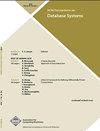数据库系统中灵活和可扩展的偏好评估
IF 1.7
2区 计算机科学
Q3 COMPUTER SCIENCE, INFORMATION SYSTEMS
引用次数: 12
摘要
个性化的数据库系统根据用户的个人喜好提供答案。虽然已经提出了许多数据库偏好评估方法(例如,skyline, top-k, k-dominance, k-frequency),但这些方法在数据库系统核心的实现是一把双刃剑。核心实现为任意数据库查询提供了高效的查询处理,但是,这种方法并不实用,因为每个现有(和将来的)首选项方法都需要在数据库引擎中实现。为了解决这个问题,本文介绍了FlexPref,一个数据库系统中可扩展的偏好评估框架。在查询处理器中实现的FlexPref旨在在一个可扩展的代码库中支持广泛的首选项评估方法。与FlexPref的集成很简单,只涉及三个函数的注册,这些函数捕捉了首选项方法的本质。一旦集成,首选项方法就会“驻留”在数据库的核心,从而能够高效地执行涉及常见数据库操作的首选项查询。本文还为FlexPref提供了一个查询优化框架,以及一个理论框架,该框架定义了在FlexPref中实现首选项方法必须展示的属性。为了演示FlexPref的可扩展性,本文还提供了案例研究,详细介绍了FlexPref中七种最先进的偏好评估方法的实现。我们还通过实验研究了FlexPref在PostgreSQL中对一系列单表和多表首选项查询的实现的优点和缺点。本文章由计算机程序翻译,如有差异,请以英文原文为准。
Flexible and extensible preference evaluation in database systems
Personalized database systems give users answers tailored to their personal preferences. While numerous preference evaluation methods for databases have been proposed (e.g., skyline, top-k, k-dominance, k-frequency), the implementation of these methods at the core of a database system is a double-edged sword. Core implementation provides efficient query processing for arbitrary database queries, however, this approach is not practical since each existing (and future) preference method requires implementation within the database engine. To solve this problem, this article introduces FlexPref, a framework for extensible preference evaluation in database systems. FlexPref, implemented in the query processor, aims to support a wide array of preference evaluation methods in a single extensible code base. Integration with FlexPref is simple, involving the registration of only three functions that capture the essence of the preference method. Once integrated, the preference method “lives” at the core of the database, enabling the efficient execution of preference queries involving common database operations. This article also provides a query optimization framework for FlexPref, as well as a theoretical framework that defines the properties a preference method must exhibit to be implemented in FlexPref. To demonstrate the extensibility of FlexPref, this article also provides case studies detailing the implementation of seven state-of-the-art preference evaluation methods within FlexPref. We also experimentally study the strengths and weaknesses of an implementation of FlexPref in PostgreSQL over a range of single-table and multitable preference queries.
求助全文
通过发布文献求助,成功后即可免费获取论文全文。
去求助
来源期刊

ACM Transactions on Database Systems
工程技术-计算机:软件工程
CiteScore
5.60
自引率
0.00%
发文量
15
审稿时长
>12 weeks
期刊介绍:
Heavily used in both academic and corporate R&D settings, ACM Transactions on Database Systems (TODS) is a key publication for computer scientists working in data abstraction, data modeling, and designing data management systems. Topics include storage and retrieval, transaction management, distributed and federated databases, semantics of data, intelligent databases, and operations and algorithms relating to these areas. In this rapidly changing field, TODS provides insights into the thoughts of the best minds in database R&D.
 求助内容:
求助内容: 应助结果提醒方式:
应助结果提醒方式:


